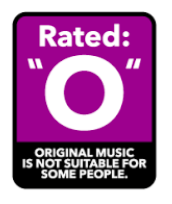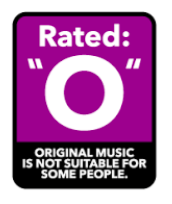Company Creates “O” Rating to Warn Audiences of Possible Exposure to Original Music.
 A surprising new study reveals that it is possible to attend a concert without hearing a cover of Jeff Buckley’s cover of Leonard Cohen’s “Hallelujah.” From open mic nights to restaurants and clubs, disappointed patrons routinely spend the entire evening talking over music they’ve never heard. As Cecil Longjaw, a St. Petersburg area stockbroker recalled, “When we walked in there, we knew there was a chance we wouldn’t hear “Mustang Sally,” but that twerp didn’t even play “Brown Eyed Girl.””
A surprising new study reveals that it is possible to attend a concert without hearing a cover of Jeff Buckley’s cover of Leonard Cohen’s “Hallelujah.” From open mic nights to restaurants and clubs, disappointed patrons routinely spend the entire evening talking over music they’ve never heard. As Cecil Longjaw, a St. Petersburg area stockbroker recalled, “When we walked in there, we knew there was a chance we wouldn’t hear “Mustang Sally,” but that twerp didn’t even play “Brown Eyed Girl.””
The landmark study was done by ConcertsInYourHome(CIYH), a company that innovates new ways for artists to disturb self-absorbed people. The study claims there is a growing talent pool of sneaky artists who are committed to playing their own songs in bars, restaurants and even people’s homes. CIYH claims these artists actually spend time writing words and creating narratives (stories) that aren’t based on classic rock misogyny or million-hit YouTube videos. But the real insult to phone-staring seat occupants is that these performers see fit to play music that is relatively unknown.
Something must be done, and Cecil is not the only one who thinks so.
“I go to a show to hear myself sing louder than the guy on stage. Anything else and it’s just not worth taking out my selfie-stick,” says Ashley Quickthumb, a 20-something blonde who knows she could win on The Voice. “If I haven’t heard your ukulele version of “Shake it Off” I just don’t see why you need to be playing out in places I might visit.”
In our investigation we found that some artists don’t even throw in a medley of 70s hits. “It’s like tradition doesn’t even matter anymore,” says Rufus Mouthsore, resident of Lake Cities, FL. “How am I supposed to stealth-grind myself against some drunk girl’s butt if the band never plays “Let’s Get It On?””

But music fans can only be pushed so far. Listening Room Network, a global network of artists who primarily play original music, has answered the call for an “O” rating to denote venues and artists who focus on original music. Venues can place “Rated: O” stickers on their entrance doors to prevent patrons from accidentally having a cultural experience. Similarly, “artistic” musicians are being asked to voluntarily wear “Rated: O” T-shirts, just in case they decide to play in public where no signs are posted. Normal music fans should memorize this sign, and look for it on the door of any place where there is music playing.
Here it is again, just in case.
Fans of background music say it’s easy to be fooled. Sometimes the musician actually sounds good, and it can take several hours before you figure out you hate him. By then the damage is done. You haven’t really partied, and you need to pay for the rounds of Jager so you can get out in time to puke in the Uber.
Says one performer, McKenzie Folkstein, “We never thought it would come to this. There’s enough shame when someone yells out “Me and Bobby McGee, dammit!” while you are in the middle of an original ballad. But now we’re being asked to wear our shame on a T-shirt, so that people can avoid us for our original sins.”
Venues across the U.S., however, are embracing the “Rated: O” designation, and are discovering that a big “Rated: O” sign on the door, when accompanied with a cover charge, does a great job of keeping out drunk frat boys, sports nuts, and other undesirables. According to James S. Immolate, a listening room venue owner in Nutjab, NJ, “Yes, we make a little less money with that sign on the door, but at least we don’t hate ourselves.”
Venues and artists can order their shirts and signs via www.ListeningRoomNetwork.com/original
Industry powerhouses ASCAP and BMI have vowed to do their part to discourage these new “songwriters.” They have teamed up with other performance rights organizations around the world to collect money from original music venues and distribute those royalties to the most successful acts on the planet. “We figure a system so insulting to American values is sure to discourage artists from playing their own songs.”
These organizations seem to be in unison. “We have all the music you need in our catalogs. These original acts just create more paperwork. We don’t want to have to update to a new version of Quickbooks.”
Music fans who do enjoy original music should subscribe to Listening Room Network and CIYH.
Edward Snipes – music reporter.
Hat tip to theonion.com

